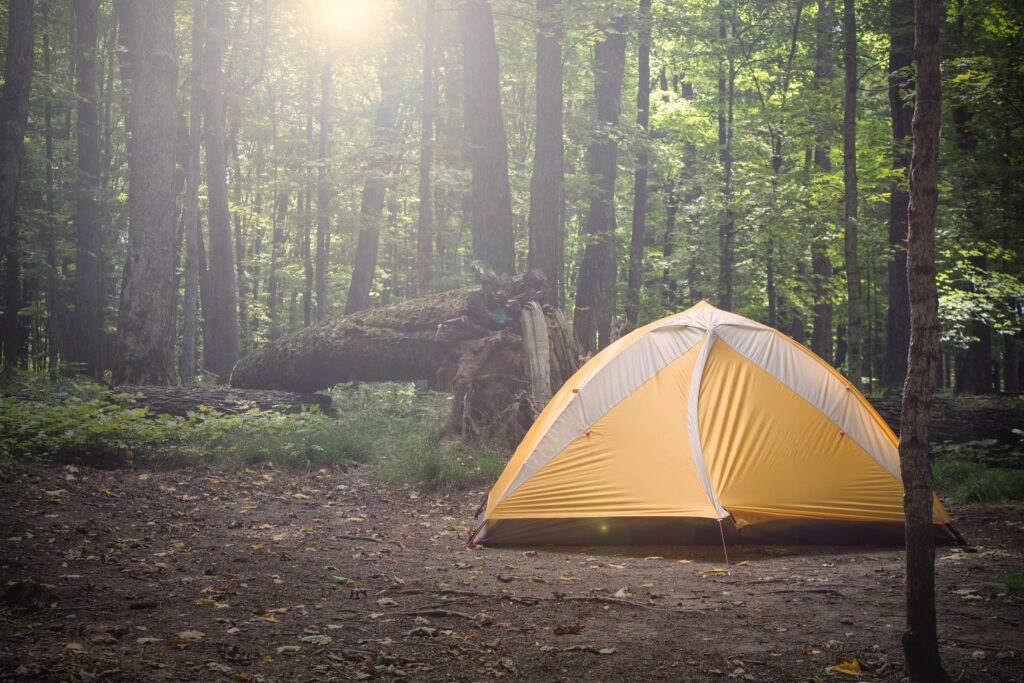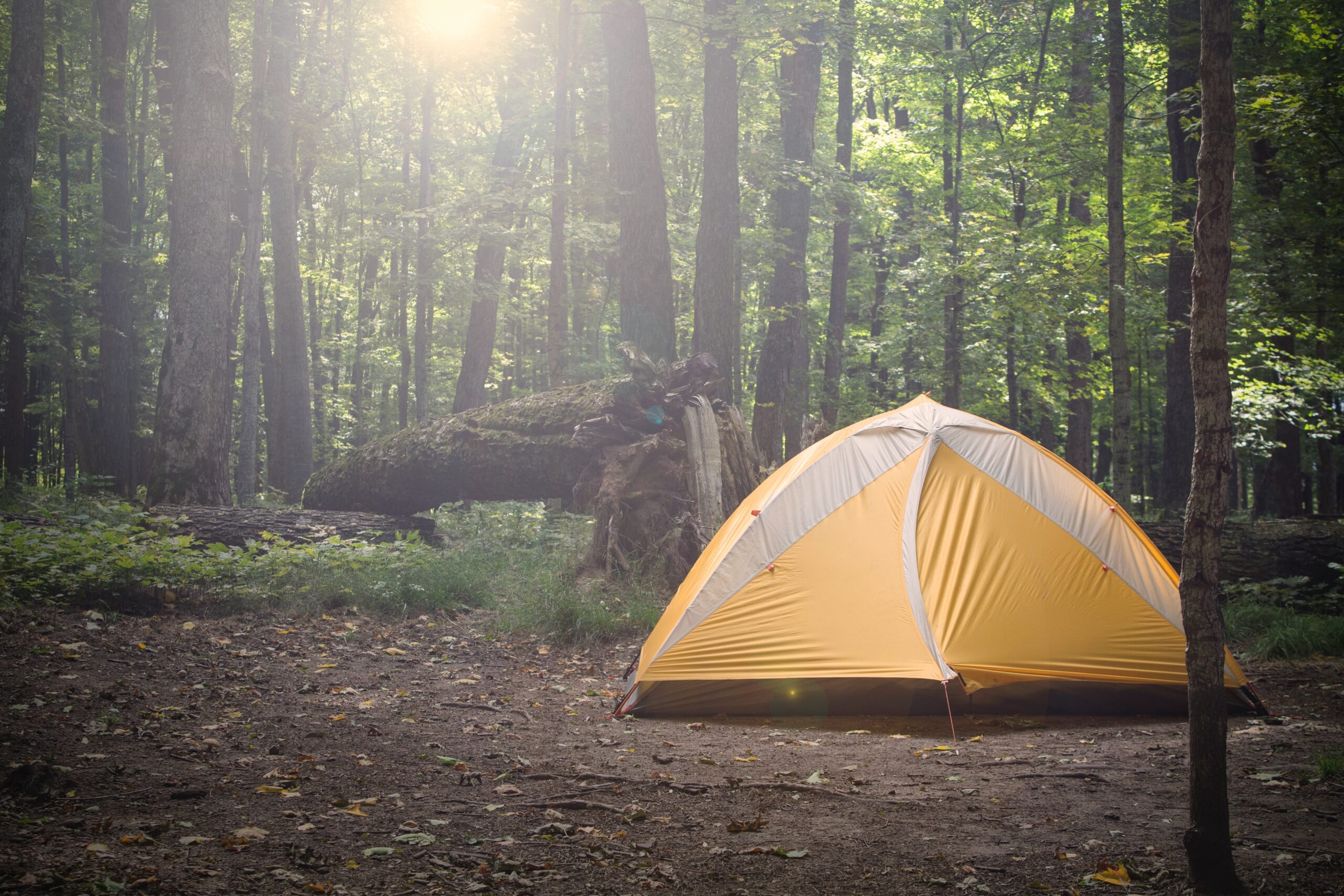Having the right camping gear for the wild establishes all the difference between a fun-filled adventure and a living nightmare. Camping is an extremely enjoyable task if done properly – and properly means “safely.” A good or back camping trip will boil down to two factors: things you packed, and things you didn’t. No matter how much of a frequent or infrequent camper you are, here’s a forest camping checklist that you must swear by if you truly want to make some happy memories on your trip. Be sure to check out our tips on preventing bugs and insects from entering your tent if camping in the forest!

Must-Haves for Forest camping
Handy Campsite Gears
- Tent
We get it – there are very few things as soothing as sleeping under the night sky that’s illuminated with small stars. However, you should always bring a tent along. When unfavorable circumstances like a sudden snowstorm, heavy downpour, or dense dew occur, a tent will protect you from the dangers of hypothermia and other mishaps; not to mention those pesky insects. A tent can also be useful in safeguarding you and your gear from dangerously high winds.
You can choose between a two-person tent and a bigger cabin-type tent, but don’t forget to bring along all the necessary accessories like tent poles, ropes, a rain fly, and, of course, stakes. Never underestimate the importance of instructions and carefully go through it to save yourself precious daylight, which can be a pretty big thing in the forest. - Sleeping Bag
These portable beddings are rather handy as they don’t take up much space, are foldable, and can be carried almost anywhere because they’re that lightweight. Some people even choose to take an additional air mattress for better comfort. - Blankets and Pillows
You can definitely try to soldier through and sleep like that, completely straight on the ground without any neck support, but if you wake up in the morning with a splitting backache, that will be on you.
Consider carrying a pillow for that added cushion. Depending on where you’re going, check the probable temperatures and remember to carry a blanket when you fear some cold hours. - Lanterns and Flashlights
With no extra source of electricity, the forest can be hauntingly dark at night. A lantern/flashlight is the most feasible way to keep things lit inside and outside the tents. For forest camping, battery powered flashlights make the most sense. Make sure that they’re fully charged so that they can last a few days. Also, remember to carry spare batteries. - Chairs
The majority of camping sites make it extra convenient by providing picnic tables, but having an extra camping chair never hurts. If you have a few bucks to spare and really wish to elevate your camping experience, maybe look into buying one. Most of them are super compact, so they’ll easily fit in the trunk of your car.
Personal Items
- Sunscreen
If you’re one of those people who think sunscreen is a myth or want to prove you’re very resistant to the rays of the sun by not putting on sunscreen, rethink your choices. These “face shields” are important for the face in all seasons, even more underneath the burning sun of summer.
Throw a mini, travel-size sunscreen in your purse/bag and thoroughly apply it before every “adventure.” Sunburns are dangerous and can effectively ruin your trip. - Bug Repellent
In the woods, the bugs are perhaps one of the bigger concerns for many, and it’s justified. You never know what diseases those insects may be carrying, so it’s crucial to always be on the safe side.
You can find a lot of things to help you tackle this issue – bug repellent sprays, ointments, wipes, essential oils, bracelets, wristbands, and even clothes. Sprays are the most common way to go because of how practical they are, but you can opt for anything as long as they’re effectively chasing those bugs away. - Toiletries
You’ll usually find bathroom and shower facilities on campsites. You have to carry your necessary forest camping toiletries like toothbrush, toothpaste, toilet paper, soaps, washes, etc. - Weather Appropriate Clothing
Camping requires packing light, so you’ll have very limited clothing options. It’s important to keep your available ones dry. Opt for a light, rainproof jacket that will go over many layers of clothes. Your backpack will contain many of your valuables, so make sure the jacket is either large enough to cover it, or you can get an extra one for the job. - First-Aid Kit
No matter what the location, you most certainly should have a medical kit in your packing list. Get a pouch that’s roomy enough to store all your medical supplies. If you take any prescribed medication, you have to pack those.
Add some basic medicines for cough, fever, cold, rash, etc. Don’t forget a thermometer and useful painkillers. Also, pack Band-Aids, antiseptic cream, bandages, cotton balls, and Q-tips for any minor cuts or burns. - Water Bottle
No matter how “cool” it may seem, drinking directly from a lake or pond can cause serious illnesses, as the water is teeming with bacteria. Even if you’re making a short journey, make sure to get at least a day’s supply of H2O to be on the safe side.
Water purification tablets are amazing little creations that try their best to make sure you never have to drink filthy, contaminated, pond water even in dire situations. - Fire Starter
Is it actually camping if there isn’t a crackling bonfire that lights up the entire zone? Campers can ignite fires with matches, a flint, and steel, a simple cigarette lighter, or even magnesium. If matches are your way to go, confirm that those are waterproof.
Additionally, take along some kindling like strips of newspaper or dry bark to feed your fire. Because no matter how easy some movies make it seem, collecting dry kindling in the woods can be very challenging.
Conclusion
At the end of the day, your enjoyment will depend majorly on the decisions you make. It’s important to have fun and explore the great surprises the wilderness hides, but it’s also important to be safe and secure. Use these simple tips and tricks to make a forest camping checklist and make sure to pack all the essential forest camping gear. Then you can potentially set yourself up for a great camping experience!

